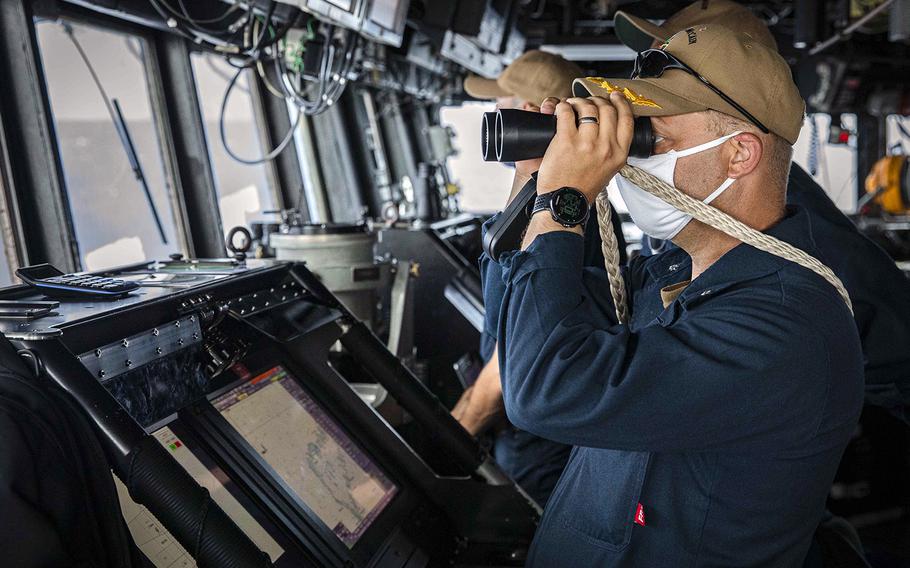
Cmdr. Ryan T. Easterday, commander of the USS John S. McCain, scans the horizon in the South China Sea from the pilot house on Dec. 22, 2020. (Markus Castaneda/U.S. Navy)
The U.S. Navy has knocked back a Chinese claim that their forces chased a U.S. warship from disputed waters in the South China Sea.
China’s state-run Global Times newspaper reported Tuesday the nation’s naval and aerial forces had “expelled” the guided-missile destroyer USS John S. McCain that day from waters near the Spratly Islands. The paper cited Senior Col. Tian Junli, a spokesperson at the Chinese military’s Southern Theater Command, as its source.
“The US action was a serious violation of China’s sovereignty and security, and it gravely disrupted peace and stability in the South China Sea, which China is resolutely against,” the paper reported, citing Tian.
The Navy on Wednesday described the claim as false.
“USS John S. McCain was not ‘expelled’ from any nation’s territory,” 7th Fleet spokesman Lt. Joe Keiley said in an email. “USS John S. McCain conducted this [freedom of navigation operation] in accordance with international law and then continued on to conduct normal operations in international waters.”
Six nations, including the Philippines, China, Vietnam and Taiwan, assert sovereignty over all or part of the chain of more than 100 small, uninhabited islands and reefs rich with fishing grounds and potential oil and gas deposits.
Vietnam, Malaysia, the Philippines and China have created outposts or bases there, according to the CIA World Factbook. China, which claims authority over most of the South China Sea, built bases capable of accommodating fighter jets and other advanced weaponry.
The McCain’s operation near the islands reflects the Navy’s commitment to uphold freedom of navigation and lawful uses of the sea as a principle, Keiley said.
“The United States will continue to fly, sail and operate wherever international law allows, as USS John S. McCain did here,” he said.
The Chinese claims about the warship are the latest in a long string of Chinese actions to misrepresent lawful U.S. maritime operations and assert excessive and illegitimate maritime claims at the expense of Southeast Asian neighbors in the South China Sea, Keiley said.
The Chinese behavior stands in contrast to the United States’ adherence to international law and vision for a free and open Indo-Pacific region, he said.
“All nations, large and small, should be secure in their sovereignty, free from coercion, and able to pursue economic growth consistent with accepted international rules and norms,” he said.
robson.seth@stripes.com Twitter: @SethRobson1